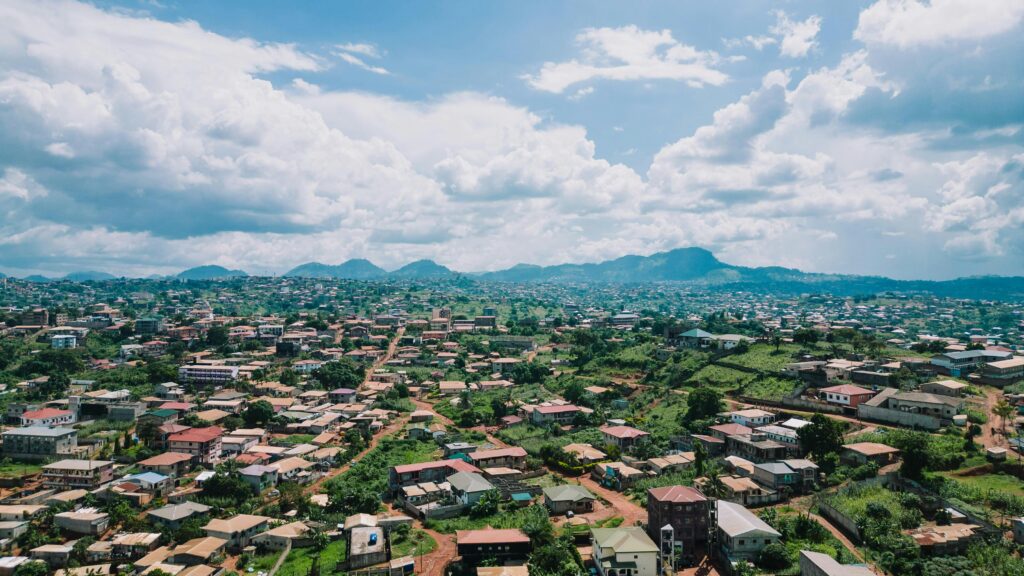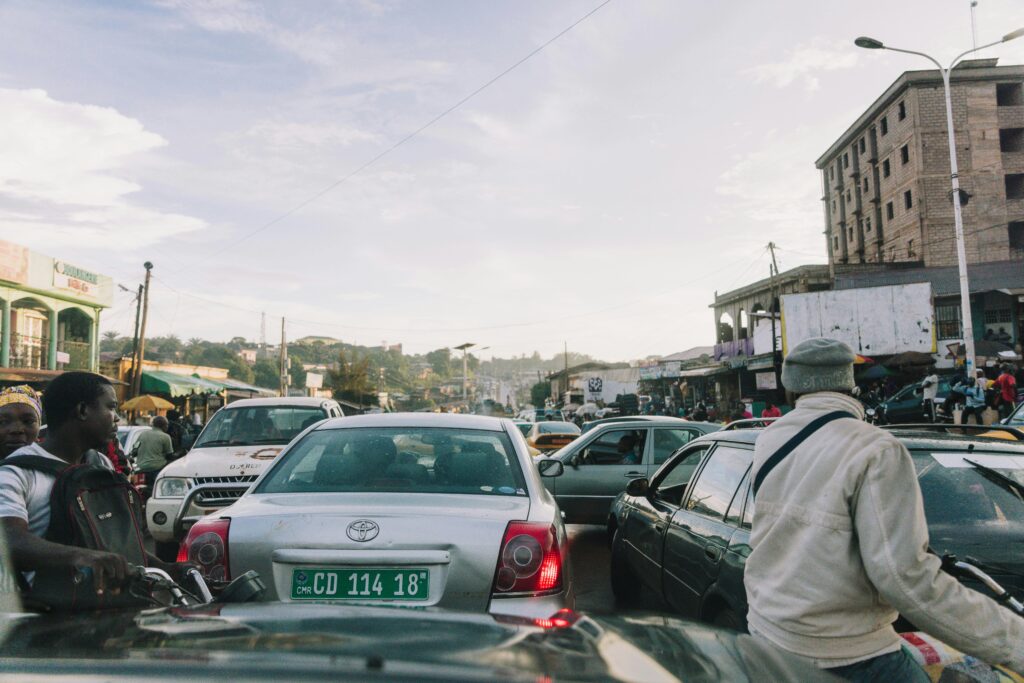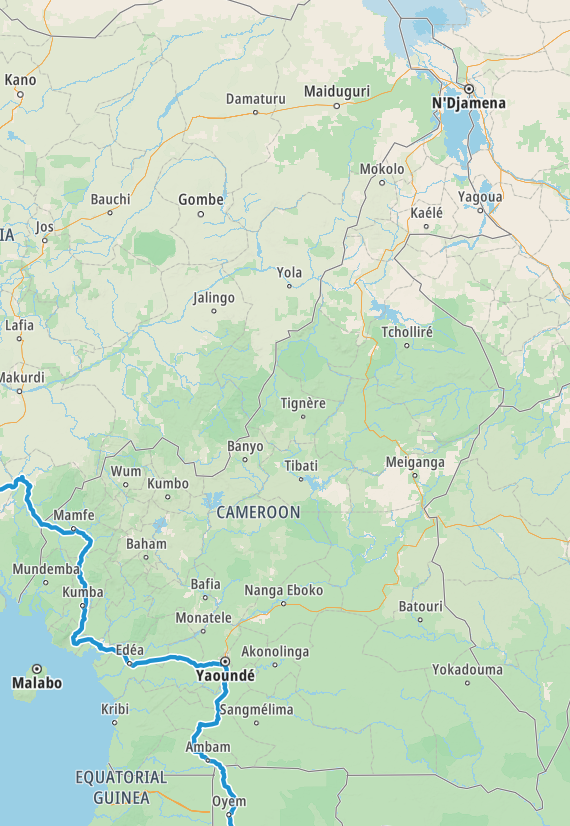Cameroon / République du Cameroun – Let’s explore here

What’s it like in Cameroon?
Cameroon is an incredibly diverse country that sits on the boundary between central Africa and west Africa. The terrain reflects almost all others found throughout Africa, and as such is often described as ‘African in Miniature’. It has beaches, mountains, rainforests, savanna and deserts – it really does have it all! It’s almost twice the size of the UK, and the highest point is the volcano, Mount Cameroon, at 13,250 ft (4,040 m) above sea level.
The population of Cameroon is around 31 million people (2024), about 4½ million of whom live in the metropolitan area of the capital, Yaoundé. The country shares land borders with Equatorial Guinea, Gabon and the Republic of Congo.

A bit about the history of Cameroon
Early History and Indigenous Kingdoms
Cameroon has a diverse and rich history. Before European colonisation, the region was home to various ethnic groups and kingdoms, including the Bakweri, Bamileke and Duala peoples. These groups had well established social structures and economies based on agriculture, trade and craftsmanship. Several powerful kingdoms, such as the Kingdom of Wum and the Kingdom of Bimbia, controlled important trade routes along the coast and inland.
European Colonisation
In the late 19th century, European powers, particularly Germany, began to colonise Cameroon. The region was claimed by Germany in 1884, becoming part of German Kamerun. During German rule, the economy was mainly based on the exploitation of natural resources, such as rubber and cocoa, and the construction of infrastructure. However, German rule was marked by resistance from local groups, including uprisings such as the 1904-1907 Mungaka rebellion.
World War I and British and French Mandates
Following Germany’s defeat in World War I, Cameroon was divided between Britain and France under the League of Nations mandate system. France took control of the larger eastern part of Cameroon, while Britain administered the western part, including the coastal region and parts of the present day anglophone areas. This division led to differences in culture, language and governance that would later contribute to tensions after independence.
Path to Independence
The process of decolonisation began after World War II. France granted independence to its portion of Cameroon on 1 January 1960, with Ahmadou Ahidjo becoming the first president. British Cameroon was given the option of joining either Nigeria or the newly independent Republic of Cameroon. In 1961, the southern part of British Cameroon chose to join the Republic of Cameroon, while the northern part became part of Nigeria. This union created a bilingual country, with both French and English as official languages.
Post Independence and Political Stability
After independence, Cameroon, under Ahidjo’s leadership, became a one party state. Ahidjo ruled for nearly 22 years, maintaining political stability and centralising power. In 1982, Ahidjo stepped down and was succeeded by Paul Biya, who had been his prime minister. Biya continued Ahidjo’s policies, maintaining control over the political system and suppressing opposition. Cameroon remained stable but faced increasing criticism for its lack of political freedoms and democratic processes.
Struggles and Challenges
In the 1990s, Cameroon faced growing opposition movements calling for democratic reforms and greater political freedoms. A multi party system was introduced in 1990, but the government’s authoritarian approach continued. Economic issues, such as high unemployment and poverty also contributed to dissatisfaction. Tensions between the francophone majority and the anglophone minority escalated, especially in the late 2010s, when anglophone separatist movements emerged in response to perceived marginalisation by the government.
Modern Cameroon
Cameroon continues to face significant challenges, including political unrest, corruption and conflict. The anglophone crisis, which began in 2016, has led to violent clashes between government forces and separatist groups in the anglophone regions. Despite these challenges, Cameroon remains one of central Africa’s most influential countries, with a strategic location and a relatively diverse economy based on agriculture, oil and services.

Cameroon road trip
Our Cameroonian road trip is part of a much larger African road trip.
Map of our road trip through Cameroon

Our planned road trip through Cameroon takes us from Nigeria via the capital, Yaoundé, before heading on to Equatorial Guinea and Gabon.
It’s likely that we’ll actually explore the country quite extensively, so we expect that this planned cross-continental route will change a lot.
Hopefully our journey will improve our knowledge of this intriguing and beautiful country, and enable us to meet some interesting people. We’ll be updating this page at that time – don’t forget to check back 🙂
What’s it like to drive in Cameroon?
They drive on the right hand side of the road in Cameroon. In the main, roads are very poor, with many being unsurfaced dirt tracks. Driving standards are also poor.
Do you require an international driving permit in Cameroon?
We’ve created a dedicated page to driving abroad, which answers this question, and more, which you might find helpful.
Can you use your UK driving license when driving through Cameroon?
We’ve created a dedicated page to driving abroad, which answers this question, and more, which you might find helpful.
Do I need a carnet de passages to drive in Cameroon?
We’ve created a dedicated page to driving abroad, which answers this question, and more, which you might find helpful.
What is the weather like in Cameroon?
The rainy season in Cameroon is from March to November. The dry season is from December to February. The best time to visit is between December to February. The worst months are July to October.
What currency do they use in Cameroon?
In Cameroon they use the Central African CFA franc, although US Dollars are also accepted. Cash is widely used. The use of credit / debit cards is not widely accepted outside of tourist areas. Travellers cheques are not readily accepted. There are few ATMs in cities and towns throughout the country.
The Central African CFA franc is used in Cameroon, Central African Republic, Chad, Republic of Congo, Equatorial Guinea and Gabon.
You should make yourself aware of the amount that your bank charges you for using credit and debit cards abroad. Often credit cards are cheaper for purchasing items directly, and for withdrawing cash from ATMs.
What language do they speak in Cameroon?
They speak French in Cameroon, although English is also spoken in some areas.
What time zone is Cameroon in?
Remember, when you’re planning your next trip to take a look at what time zone it’s in.
Do I need a visa to visit Cameroon?
We’ve created a dedicated, more comprehensive page on visas, which you should find helpful. Check it out!
Is wild camping legal in Cameroon?
Yes, wild camping is fine in Cameroon.
What plug / socket type do they use in Cameroon?Cameroon
In Cameroon they use plug / socket types C and E.


Health issues in Cameroon
Is it safe to drink water in Cameroon?
No, it is not safe to drink tap water in Cameroon. Bottled water is readily available throughout the country.
What vaccinations are required for Cameroon?
This NHS website is kept up to date with all relevant information on vaccinations in Cameroon.
Phones in Cameroon
What is the country calling code for Cameroon?
The country calling code for Cameroon is +237
What are the emergency phone numbers in Cameroon?
- The emergency number for police in Cameroon is: 112 / 117
- In Cameroon, the emergency number for ambulance is: 112 / 119
- The emergency number for fire in Cameroon is: 112 / 118
If you’ve got some useful info that you’d like to share, let us know!
And don’t forget to check out all the other pictures!
